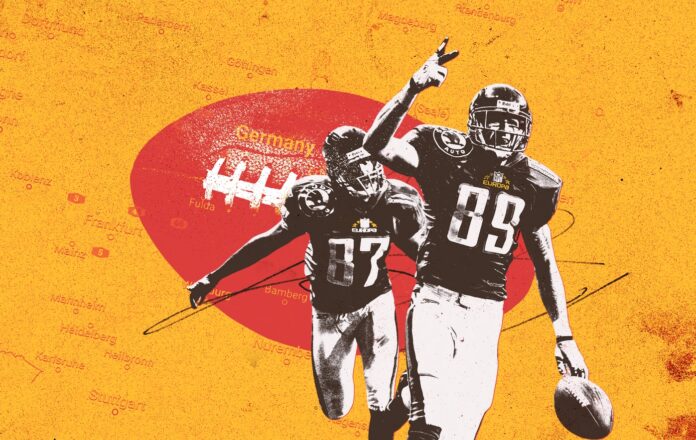The world’s most lucrative sports team is the Dallas Cowboys, a member of the US’s NFL. This news might shock some sports fans around the world, who may have assumed that FC Barcelona or Real Madrid would take the cake. For others, it might sound right on the money—literally.
The NFL is internationally known as a uniquely US pursuit, tied to business interests just as much as to sport. Though often lumped in with other major North American leagues like the NBA and MLB, the NFL doesn’t cross the border into Canada. Instead, the Great White North runs its own Canadian Football League (CFL).
The dissonance between how much money and power the NFL wields in the US compared to its international reputation is one of the league’s most prominent features. In the US, it’s an ingrained part of life. Fans are highly engaged, following top players like Patrick Mahomes and Jalen Hurts, who are favorites in this year’s prop odds on the regular season MVP.
The NFL’s single-elimination playoff series also captures the attention of fans, culminating in a Super Bowl event that draws in over 100 million concurrent viewers. Clearly, the league is on par with football/soccer leagues like La Liga and the Premier League. But that doesn’t mean fans of either appreciate the NFL.

A Laundry List of Complaints
The NFL is underrated abroad—if it’s rated at all. In fact, football/soccer fans around the world, along with those of other popular sports like cricket and rugby, are usually baffled by the NFL’s reach. The sport takes a bit of studying given how many unique positions it involves on the separate offensive and defensive teams. From the sidelines, the action also starts and stops way too often to be fluid.
And then there’s the NFL as an organization. It’s reviled in many places because it’s seen as a cash grab. The NFL runs as a franchise league, which means team owners must pay big to buy a team, and then are granted certain rights (like media and marketing) from the NFL’s front office where a commissioner runs the show.
And that’s just the tip of the iceberg when it comes to opinions on the league. Some might point to the fact that teams can be bought and sold to new cities, leaving fans high and dry. Others might instead focus on the fact that the NFL is a money-making machine. As mentioned above, the Cowboys are the world’s most profitable team… despite not having won a Super Bowl since 1995.
So, is it about sports at all? Or is the NFL underrated abroad? Let’s dive in.
Reason #1: All About the Spectacle
The NFL is one of the most stats-heavy leagues in the world. From the outside looking in, games might look like complex (if not boring) arrangements that lead to short bursts of exciting plays. This type of format lends well for stats, along with the NFL’s long list of specialized positions (22 to be exact).
This means there’s plenty for fans to chew on. It’s part of the reason why fantasy football is so huge—it provides an endless reel of fan entertainment and engagement. This is one of the most unexplored reasons why the league does so well: it caters to fans who want to tinker with stats and make forecasts for themselves.

Reason #2: Leveling the Playing Field
The NFL is undeniably a business before it’s about the cultural institution of American football. This puts it in direct odds with football/soccer leagues like the Premier League, which aim to keep the focus on football and its fanbase (though that may be changing rapidly thanks to new ownership).
The NFL, for all its profiteering, attempts to level the playing field—if not in front offices, then at least on the gridiron. This means that the teams which perform the worst in a season are offered a better draft pick to select amateur talent from the NCAA. Teams that perform at the top of the league must wait for later drafts.
The idea is to make teams competitive to avoid wealthy teams taking the Super Bowl year after year. It’s not a perfect system… but some might argue that concerns about parity are handled better than in a league like the Bundesliga, where Bayern Munich and Borussia Dortmund have taken home a disproportionate amount of awards in the last decades.
Reason #3: A Femme Fanbase
Though seeing less coverage in mainstream media, women around the world make up huge portions of major league fanbases, from rugby to football to basketball. And though often dubbed a ‘bro sport’ in the US, 46% of the NFL’s fanbase is female (compared to 29% in the Premier League). That means there are 84 million women supporting a team around the country.
Let’s be clear on this: the NFL does not support a women’s league like the Women’s Super League, which is overseen by the FA. In fact, the NFL’s closest attempt was the Lingerie Football League, launched back in 2009—which was a clear loss for the sport, for women, and for the NFL.
However, it’s worth pointing out that the NFL has an organically large base of female fans. In other words, the league hasn’t attempted to build a female fan base with pink-themed raffles. They simply grew up watching and engaging with the sport. And that’s worth pointing out.

Impact of American Culture Export
The export of American culture, a phenomenon often termed “cultural imperialism,” plays a pivotal role in shaping global perceptions, including sports like the NFL. Movies, TV shows, and international celebrities sporting NFL jerseys or discussing the game contribute significantly to its global allure. The depiction of high school and college football in American films and series often romanticizes the sport, making it intriguing to an international audience. Big events like the Super Bowl are not just sports events but cultural spectacles, featuring halftime shows with global music icons and attracting extensive media coverage. Such portrayals not only increase the sport’s visibility but also align it with a broader cultural context, making it appealing beyond its gameplay. This cultural export indirectly influences international audiences, leading to increased interest in the NFL and even participation in activities like Super Bowl Betting Promos, despite geographical and cultural distances.
Player Internationalization and Exchange Programs
The NFL’s efforts to globalize American football extend to player internationalization and exchange programs. Initiatives like the International Player Pathway program aim to recruit and develop talent from across the globe, offering athletes from various backgrounds a chance to train and potentially play in the NFL. These efforts are complemented by American football training camps and exhibitions abroad, aiming to foster talent and build a global fan base. By investing in the international growth of players, the NFL not only enriches its talent pool but also enhances its appeal to global audiences, presenting the league not just as an American pastime, but as a global sport with diverse representation and international opportunities.
Room for Growth
The NFL is underrated abroad because it’s an easy league to hate. Its business-first approach to the sport presents unsurmountable issues for many international fans—but could that change in the future? In either an attempt to build an international following or else rake in millions more in profit (or both), NFL Commissioner Roger Goodell has worked in the last years to expand the International Series.
In the coming years, the NFL will play regular season games in Mexico City, Munich, Frankfurt, and London. All 32 teams were also given marketing rights for different global regions, which means they can begin to create fan engagement activities. Will it prove viable in the long run? Or is the NFL too American for a global audience?









